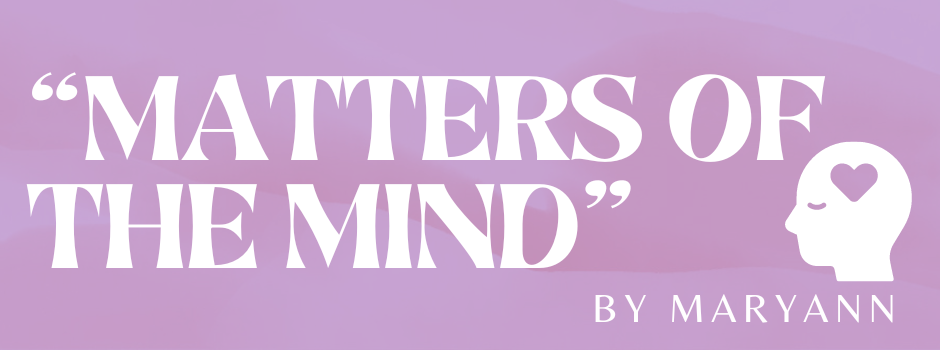“Matters of the Mind” By Maryann
 There’s just something about walking out in nature that soothes me. Marvelling at the different shades, seeing the beautiful portrait of flowers, hearing the songs of the birds and symphonies of the winds. Nature steadies my heart rate, my brain is inspired, my body loosens, I feel free. In nature I can remove myself from whatever worries threaten my peace – I can just be!
There’s just something about walking out in nature that soothes me. Marvelling at the different shades, seeing the beautiful portrait of flowers, hearing the songs of the birds and symphonies of the winds. Nature steadies my heart rate, my brain is inspired, my body loosens, I feel free. In nature I can remove myself from whatever worries threaten my peace – I can just be!
So, when “family step challenge” pinged up in our group chat, I had to get involved, and I’m so thankful for the motivation and reminder it gave me. I forced myself to make time to walk in parks and see the perfectly imperfect God-given magnificence of the world (well South London at least). I exchanged smiles, pleasantries and stories with people who walked by, I played with the dogs who sniffed at my legs and laughed at squirrels scurrying across my path. For the hour or so that I spent on those walks lupus didn’t control me, moving mended my soul.
May is Lupus Awareness Month in some countries, and the 10th is World Lupus Day, also the 13th- 19th of May is Mental Health Awareness Week in the UK. From the moment you’re diagnosed you’re told to avoid stress. Stress is believed to be a trigger for flares. It’s also believed that experience of trauma can bring on symptoms of lupus. I recall being asked if I’d experienced any recent trauma when they were trying to diagnose me. At the time I said no, but when I reflected on it, I knew that that wasn’t true. I looked back at when I had first started feeling the aches in my wrists all those years ago, what was going on in my life? I remembered that the pain began to manifest after a couple of years of back-to-back loss, grief, and heartache. I remember that I’d been feeling emotionally numb for months and was masking my feelings (much like how many who have chronic conditions mask every day). Truth be told I’d spent years inwardly sad, but outwardly performing.
“Truth be told I’d spent years inwardly sad, but outwardly performing.”
Working over a decade for the MPS, I heard, read, and managed stressful and traumatic events almost every day. I learnt to compartmentalise to deal with trauma in my real world as I did in my work world. Wanting to have a positive impact on youth, I became a foster carer, and as much as I love it, I can’t pretend that the role isn’t blanketed with trauma. The children experience emotional pain, so you carry it with them, and sometimes for them. Sometimes they take the depth of their feelings out on you, attacking and acting out, unintentionally traumatising you. So, when the consultant asked if I’d suffered from any trauma my answer should’ve been YES!
Generally, we don’t want to identify events that we deem everyone to have experienced as being traumatic, but trauma is subjective, we all feel things differently. Research has shown that the scarring from trauma can sometimes cause our body to respond by trying to protect us, fighting against the unwanted (sadness), simultaneously hurting us in the process; as in the case of auto-immune conditions. There’s believed to be a link between trauma, persistently raised cortisol levels and auto-immunity.
Symptoms play a major factor in the mental wellness of someone who is chronically ill. With lupus; low mood, depression, hallucinations, intrusive thoughts and changes in personality are actual symptoms. Lupus can attack the brain and affect how we feel and process information. Other symptoms such as pain, memory loss, hair loss, loss of mobility, fatigue, skin issues, migraines etc can become stressors, subsequently leading to a decline in mental health. Constant appointments, medical gas lighting, not being believed, taking medication, not being able to do the things you used to do, can cause anxiety and depression. Staying mentally healthy while chronically ill is a challenge that you have to be in to understand. I’m in constant battle with my neurological and physical symptoms. I recognise when I’m about to flare because I’m less able to emotionally regulate, and anxiety, brain fog and intrusive thoughts come along.
mood, depression, hallucinations, intrusive thoughts and changes in personality are actual symptoms. Lupus can attack the brain and affect how we feel and process information. Other symptoms such as pain, memory loss, hair loss, loss of mobility, fatigue, skin issues, migraines etc can become stressors, subsequently leading to a decline in mental health. Constant appointments, medical gas lighting, not being believed, taking medication, not being able to do the things you used to do, can cause anxiety and depression. Staying mentally healthy while chronically ill is a challenge that you have to be in to understand. I’m in constant battle with my neurological and physical symptoms. I recognise when I’m about to flare because I’m less able to emotionally regulate, and anxiety, brain fog and intrusive thoughts come along.
“Staying mentally healthy while chronically ill is a challenge that you have to be in to understand.”
It’s almost impossible for someone who is chronically ill to avoid stress; lifestyles mean it’s not something that we can get away from. However, I’ve learnt that instead of compartmentalising, I need to be flexible, to adapt. I try not to fight my feelings anymore; my body is doing enough fighting. I accept them, speak about them, and when I can’t verbalise how I feel, I write (I highly recommend creating a rant book). Taking off the mask and being honest can alleviate some of the pain. I can’t always go out for walks to feel better, but I can bring the outdoors in. I surround myself with plants and flowers indoors. I seek out loved ones who can bring out the smile and giggles. I let go, because one thing lupus has taught me is that I’m not in control, if my cereal milk spills, I clean it up and have toast instead.
“So, don’t worry about tomorrow, for tomorrow will bring its own worries. Today’s trouble is enough for today” (Matthew 6: 34)
All you can do is try to find the joy, keep moving, keep breathing, take one day at a time and remember that you’ve won 100% of your days so far!


